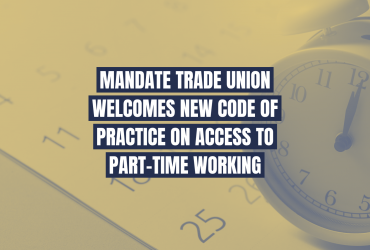Mandate General Secretary John Douglas addresses Oireachtas Committee on Jobs to discuss low paid workers
Friday 17 February 2012Mr. John Douglas: The inability to pay clause and the five years that must elapse before applying for another derogation is sensible but at the extreme end of long. One is dealing with someone’s legal rights and entitlements. It is a serious matter when an employer can go to a State institution and say that it is looking for a derogation to not give someone their legal rights. The measure should only be considered in exceptional circumstances with no multiple applications. Unfortunately, there are occasions when businesses are no longer sustainable. The danger of having multiple applications and ones with short timeframes is that unfair competition will be created. The shop on the other side of the street that tries to pay, and do the decent thing by paying the rates of pay and meeting conditions of employment, becomes uncompetitive because its competitor across the road has multiple applications for derogations. That is an important issue and cannot be overlooked.
With regard to the casting vote of the chairperson, it has been tightened greatly in the present Bill. The JLC chairperson will not have an absolute casting vote. Where parties disagree then the case is referred to the Labour Court to consider all of the arguments from the employer and employee sides before making a determination. The case then reverts back to the JLC chairperson and if the parties do not reach an agreement a second time then the chairperson has no latitude. The parties must do what the Labour Court directs. The casting vote is handcuffed to what the Labour Court determines and is not a free casting vote. Frankly, it makes some sense and gives a wider breadth to the arguments that can be made on a topic. The Labour Court is a pan-employer and pan-employee trade union body that will take into consideration all matters before it issues an arbitration type decision. There is no danger in that.
In terms of the JLC and the re-establishment of decency threshold and its danger to jobs, more people were employed in the retail sector with a JLC than there is now.
Following further question John Douglas continued . . .
Mr. John Douglas: I will deal with the Chairman’s question. The problem with the retail sector is the collapse in the domestic economy. People have no money to spend which has impacted on the retail economy and on consumer spending. Until we, or someone, comes up with a plan to put money back in people’s pockets, including low-paid workers, to spend in the local economy and keep pubs, restaurants, bookies and newsagents going then we are in serious trouble. It is not the difference between €8.65 and €9.20 in the JLC that will make the difference. There is a sensibility around. It took us over 20 years to reach €9.60 per hour in the groceries JLC. It is hardly a king’s ransom nor will it enable people to buy a second home. Men and women are working for extremely profitable retailers yet they are paid a rate of €9.60 per hour for working a breadth of hours over a seven day liability and is no more than they deserve. The national minimum wage is the ultimate safety net. There are sectors that can bear slightly higher rates of pay and conditions than the national minimum wage.
Read full debate here






